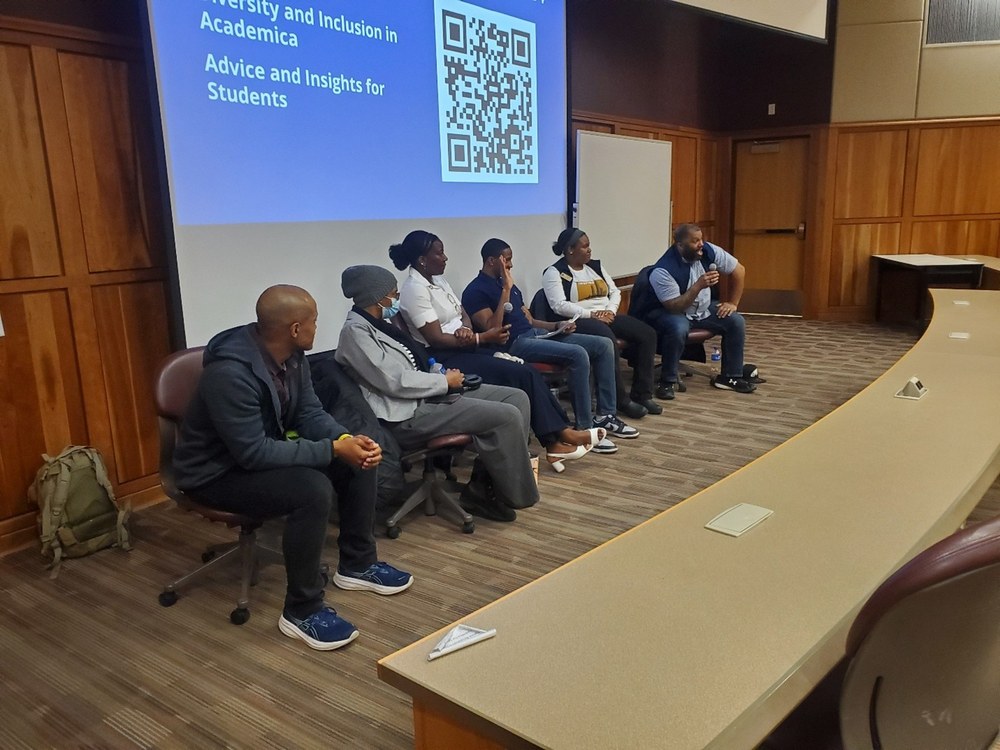Posted: April 8, 2025
Thursday, February 27th, in observance of Black History Month, the Ecosystem and Science Management’s Inclusion, Diversity, Access & Equity Committee organized a panel discussion featuring Black scientists from Penn State's College of Agricultural Sciences.

The Ecosystem and Science Management’s Inclusion, Diversity, Access & Equity Committee panel discussion
Creating an inclusive and supportive environment for minority groups in science is crucial for fostering both diversity and innovation. Providing a platform for individuals from underrepresented backgrounds to share their experiences not only amplifies their voices but also contributes to cultivating a more welcoming and equitable academic community. On Thursday, February 27th, in observance of Black History Month, the Ecosystem and Science Management's Inclusion, Diversity, Access & Equity Committee organized a panel discussion featuring Black scientists from Penn State's College of Agricultural Sciences. This event brought together scholars from various disciplines and career stages to engage in a dialogue about their experiences navigating academia. The primary objective of the panel was to deepen understanding of the challenges faced by Black students and faculty within academic settings. Additionally, the discussion aimed to promote actionable solutions to advance diversity and inclusion within the College of Agricultural Sciences and to strengthen the overall academic community. The event was well-received, with 35 attendees and positive feedback from 16 survey respondents, many of whom expressed interest in attending future events focused on diversity.
The panelists were asked a series of thought-provoking questions to explore their journeys and experiences in academia. These included reflecting on the life events that influenced their career paths, the challenges they faced, and how they overcame them. They were also encouraged to discuss the role of Black role models and mentors in shaping their academic journeys and how these relationships have impacted their perspectives on STEM fields. Lastly, the panelists shared advice they would offer their younger selves based on lessons learned and discussed Black scientists' common challenges in the United States.
Throughout the discussion, panelists noted several key themes that were important for creating an inclusive academic space. These included the importance of representation, mentorship, and self-acceptance of one's own culture and identity.
Events such as this panel discussion are invaluable in providing critical insight into the experiences of Black scientists while promoting a culture of inclusivity. Looking ahead, the Inclusion, Diversity, Access & Equity Committee plans to host additional events that amplify diverse voices and create spaces for meaningful dialogue. By continuously uplifting underrepresented communities within science, we can contribute to the development of a more equitable and inclusive academic environment—one where all aspiring scientists have the opportunity to flourish.
Meet the Panelists
Di'Carlo Jackson Jr. is a second-year Master’s student in Ecology at Penn State, focusing on the life history implications of body size evolution in Channel Island reptiles, while also serving as a DEI leader within the College of Agricultural Sciences, working to support underrepresented students and foster inclusive academic spaces.
Dr. Milton Newberry III is the Director of Student Advocacy and Access Programs at Penn State, where he supports undergraduate and graduate students, mentors on career development, and creates programs that promote diversity and innovation in agricultural disciplines.
Dr. Jared Gregory Ali is the Dorothy Foehr Huck and J. Lloyd Huck Endowed Chair of Chemical Ecology and an Associate Professor at Penn State, researching plant-insect-microbe interactions and chemical signaling, while also advocating for diversity and inclusion in the sciences and contributing to sustainable pest management.
Dr. Vanessa "Sue" Wacleche is an Assistant Professor of Immunology at Penn State, with a research focus on autoimmune diseases, particularly lupus, and is an advocate for underrepresented communities in science, having been recognized with the Lupus Research Alliance Diversity in Lupus Research Postdoctoral Award.
Logan Quinn is a graduate student in the Education Policy and Leadership program at Penn State, where she is dedicated to fostering inclusive educational environments and serves as a graduate student advisor and leader in community engagement efforts, including organizing the Martin Luther King Jr. Day of Service.
Keia Jones is a doctoral candidate at Penn State, pursuing dual degrees in Rural Sociology and International Agriculture and Development, with research on sustainable entrepreneurship and water policy, while also holding leadership roles in multiple graduate student organizations and being recognized for her contributions to sustainability and community engagement.

